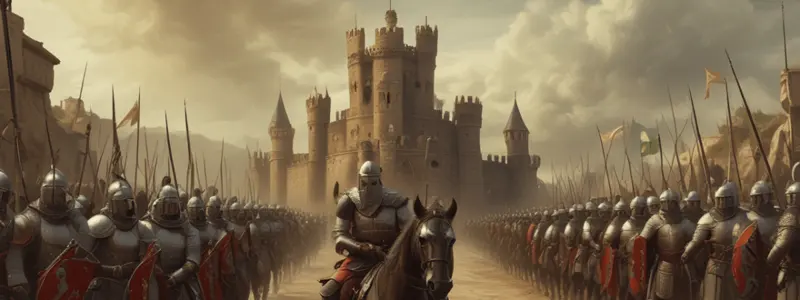Podcast
Questions and Answers
What was the primary objective of the war?
What was the primary objective of the war?
- To gain power over Aquitaine (correct)
- To capture the French throne
- To unite England and France
- To spread the Black Death
What event interrupted the war between 1347 and 1351?
What event interrupted the war between 1347 and 1351?
- The Black Death (correct)
- The Treaty of Brittany
- The Battle of Agincourt
- The Battle of Creasy
Who led the French troops in multiple pivotal battles?
Who led the French troops in multiple pivotal battles?
- King Charles VII
- Edward III
- King Henry V
- Joan of Arc (correct)
What was the significance of the Treaty of Troys?
What was the significance of the Treaty of Troys?
What was the outcome of the Battle of Agincourt?
What was the outcome of the Battle of Agincourt?
Flashcards are hidden until you start studying
Study Notes
- The Hundred Years War was a significant armed conflict between France and England during the medieval period, spanning from 1337 to 1453 with intermittent periods of truce.
- The war originated from a disagreement over the rightful heir to the French throne, but quickly turned into a struggle for power over Aquitaine, a region in southwest France that had been under English rule since the 12th century.
- The English royal family, with a French lineage, traced their lineage back to William the Conqueror, a Norman Lord who became the king of England in 1066, making them vassals of the kingdom of France.
- The relationships between the two kingdoms became strained when France attempted to limit English influence, particularly when England engaged in a conflict with Scotland, a key ally of France.
- In 1328, the kingdom of France underwent significant changes following the death of King Charles IV, who had no male heirs, raising the question of who would succeed him.
- King Edward III of England had a rightful claim to the throne as he was the nephew of Charles IV, but Philip, count of Valois, emerged victorious and was crowned as King Philip VI of France.
- Philip VI's initial action was to release a decree stating that the English territories in France were henceforth the possession of the French monarchy, prompting Edward III to proclaim himself as the ruler of both England and France in 1337.
- The war involved naval battles, raiding of castles and villages, and weakening the economy and infrastructure of the opposing side, with the objective of gaining power over Aquitaine.
- The Battle of Creasy in 1346 marked the first significant conflict of the Hundred Years War, where the English army decisively defeated the French despite being outnumbered.
- The English captured the port city of Calais in northern France, which remained under English control for the next two centuries.
- The Black Death interrupted the war between 1347 and 1351, causing a 40% drop in the European population and rendering no country able to engage in warfare.
- The Treaty of Brittany was signed in 1360, granting Edward III control of a significant portion of Aquitaine and other regions in southwestern France, but it was not well received in France and did not endure for long.
- King Henry V, a prominent military leader for the English, initiated a military expedition in France in 1415, achieving a remarkable triumph at the Battle of Agincourt despite having a significantly smaller army.
- Henry V strategically utilized the marshy and narrow terrain of the battlefield to his advantage, employing longbows and archers to defeat the French knights.
- The Battle of Agincourt had a significant impact on the war, weakening the French position and bolstering Henry V's claim to the French throne.
- The Treaty of Troys was signed in 1420, solidifying Henry V's claim as the rightful heir to the French throne and formalizing his marriage to Catherine of Valois, but his aspirations to unite England and France were cut short by his premature death in 1422.
- King Charles VII led France to recovery, establishing a new capital in Bourges and aided by Joan of Arc, who played a significant role in leading the French troops in multiple pivotal battles.
- The war became more of a defensive effort for England, with the loss of their primary allies, the Burgundians, in 1435, and France capturing the city of Dieppe and regaining Paris in 1436.
- The Hundred Years War concluded in 1453 as the French successfully recaptured the city of Bordeaux, the final significant English stronghold in Aquitaine.
- The war inflicted significant costs on both sides, resulting in the loss of thousands of lives and a substantial economic impact, and had a significant impact on the development of military strategies and tactics in Europe.
- France successfully adapted to the new war tactics introduced by the English, including the large-scale use of skilled archers, and developed its own tactics to neutralize the English archers, including the use of cannons and rudimentary firearms.
Studying That Suits You
Use AI to generate personalized quizzes and flashcards to suit your learning preferences.



